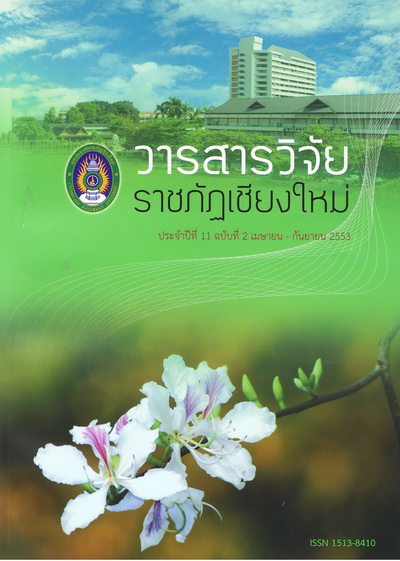การศึกษาเปรียบเทียบคำคุณศัพท์ภาษาจีนกับภาษาไทย
DOI:
https://doi.org/10.14456/rcmrj.2010.95866Keywords:
การศึกษาเปรียบเทียบ, คำคุณศัพท์, หน้าที่, ตำแหน่ง, การซ้ำคำคุณศัพท์, Comparative Study, Adjective, Function, Position Reduplication of AdjectivesAbstract
บทคัดย่อภาษาไทยไม่สมบูรณ์
The Comparative Study of Chinese and Thai Adjectives
The purpose of this paper is to study and compare the similarities and differences between Chinese and Thai adjectives in their syntactic function, position and reduplication.
Through study and comparison, it shows that the syntactic function, position and reduplication of adjectives in both Chinese and Thai have similarities and differences. Similarities: Chinese and Thai adjectives can be used as attributes in the sentence as well as predicates, and adverbials; the overlap mode is AA????AABB and ABAB; the meaning of some adjectives change after overlap; semantic degree of some adjectives increase after overlap and some reduce to show uncertainty; some completely change after overlap.
Differences: Thai adjectives can be used as complements, just as Chinese adjectives do; Thai adjectives are unlimited when they function as an attribute, predicate and adverbial, with no necessity to use auxiliary words. In Chinese, however, auxiliary words become necessary in most cases when multi-syllable adjectives are used as an attribute, predicate and adverbial. For example: “????????(????)” is needed when an adjective functions as an attribute, “????????(????)” is needed when an adjective is used as an adverbial, while “????????(????)” is a must if an adjective functions as a complement; Chinese adjectives are placed before the modi????ed word when they are used as attributes and predicates, but when it comes to the case of complement, adjectives have to placed after the modi????ed word. In Thai language, adjectives, when functioning as modi????ers, are positioned after the modi????ed word; the reduplicative pattern of A(li)AB in Chinese does not have an equivalent in Thai language, while the reduplicative pattern of A ???????????? A and reduplicative variant (in which the tone of the preceding word changes or some individual syllables are reduplicated) in Thai language is absent in Chinese; the meaning of Chinese and Thai adjectives are also different after reduplication: in Chinese, some adjectives express the idea of likes or dislikes after reduplication, and some are more vivid than they are before reduplication. In Thai, some reduplicative expressions have the same meaning as the adjectives before reduplication, while some express a deeper meaning after reduplication.
Downloads
Downloads
How to Cite
Issue
Section
License
1. Articles, information, content, images, etc published in the “Community and Social Development Journal” are copyrighted by the Community and Social Development Journal, Chiang Mai Rajabhat University. In order to properly distribute the articles through print and electronic media, the authors still hold the copyright for the published articles under the Creative Commons Attribution (CC BY) license, which allows the re-distribution of the articles in other sources. References must be made to the articles in the journal. The authors are responsible for requesting permission to reproduce copyrighted content from other sources.
2. The content of the articles appearing in the journal is the direct responsibility of the article authors. The editorial board of the journal does not necessarily agree with or share any responsibility.














